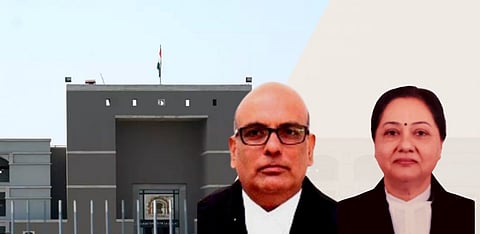

The whole incident is obviously not the best advertisement for judicial conduct, and should serve as a cautionary tale on court decorum. Judges are human, but should they be seen to be human?
—
THAT judges need to cultivate a certain gravitas is a principle so universally acknowledged that it needs no codification.
But every now and then we are reminded that judges are sharers in a common humanity, subject to the same struggle to tame biases and emotions as the rest of us.
In this age of video recording of court proceedings and live broadcasts, such reminders are likely to linger in public memory.
One such reminder presented itself recently at the Gujarat High Court when a male judge stormed out of the courtroom after yelling at his junior female colleague on the Bench.
The incident occurred on October 23. Justice Biren Vaishnav, who was heading a division Bench also comprising Justice Mauna Bhatt, announced while walking out of the courtroom that the Bench would not be hearing any further matters on that day.
The Bench was hearing a matter in which Justice Vaishnav was heard dictating that the respondents could proceed with the impugned notice. Justice Bhatt tried to murmur into the ears of Justice Vaishnav, possibly to convey her disagreement with the Order. This irked Justice Vaishnav. He raised his voice to tell the junior judge on the Bench, "You differ yar."
The courtmaster asked for the Order in the connected matter, Justice Vaishnav said: the same Order. This time Justice Bhatt possibly expressed her disagreement by murmuring again. Justice Vaishnav again retorted: "We have differed in one, we can differ in the other."
Justice Bhatt responded, "It is not a question about differing."
Justice Vaishnav raised his voice again and told Justice Bhatt: "Then do not murmur, you pass a separate Order then."
"We are not taking more matters," he said as he rose from his chair, leaving an agape chair beside a distraught Justice Bhatt, who proceeded to quietly gather her papers.
Apparently, the Gujarat High Court has pulled down the exchange from its live-streaming platform.
As a matter of convention and practice, judges confer with each other before taking a view on a matter, especially in matters where interim Orders are to be passed.
Usually the presiding judge dictates the Order, unless they have requested the junior judge on the Bench to dictate the Order.
However, nothing prevents a member of the Bench from dictating a separate Order.
Recently, a division Bench of the Supreme Court comprising Justice Hima Kohli and Justice B.V. Nagarathna disagreed with each other in open court on whether to allow a 26-week pregnant woman to terminate her pregnancy.
However, the two judges expressed their disagreement while maintaining court decorum and keeping their judicial temperament intact. Both judges first conferred with each other before announcing in the open court that there was a disagreement between the two.
While Justice Kohli dictated in the open court that her judicial conscience did not permit her to allow the termination of the pregnancy, Justice Nagarathna decided to respectfully disagree with Justice Kohli. In fact, it was Justice Kohli who brought the mic closer to Justice Nagarathna so that the latter could dictate her separate Order.
In 2016, Justices Arun Mishra and M.Y. Eqbal had a spat while sitting together on a Bench. Justice Eqbal wanted to issue notice in the matter before the Bench, while Justice Mishra wanted to dismiss it. During the impasse, Justice Eqbal commented that he had been presiding over the Bench for three years. Justice Mishra responded by saying he was not going to back off since he had equal rights as a puisne judge.
As a matter of healthy convention at the Supreme Court, if two judges disagree on whether to issue a notice in a matter, the notice is issued nevertheless.
Today, Justice Biren issued an apology for shouting at Justice Bhatt.
"I am very sorry for whatever happened on Monday. I am sorry for that and I think it should not have happened," Justice Biren told Justice Bhatt in the presence of advocates in the courtroom.
Under the watchful gaze of the all-seeing camera, an apology that may not be able to wipe out the memory of the incident.